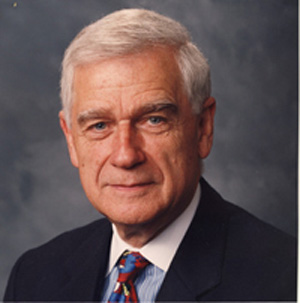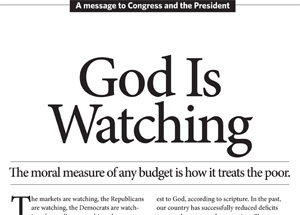Republican
When President Barack Obama laid out his deficit plan Monday, he wasn't just trying to sell a policy. When he pressed for tax hikes on the rich and announced, "This is not class warfare," he was trying to exorcise a demon that has bedeviled the Democratic Party for decades and in the process deprive the Republicans of one of their trustiest weapons. The reaction from the right was swift and sure: "Class warfare!"
Rick Perry was recently asked by a nine-year-old "If you were a super hero, what kind of super hero would you be?" His answer to the child's benign question was simultaneously predictable and profound: Superman.
First, here's the transcript portion of the last five minutes of President Obama's speech where he really got his preach on:
Did anyone else get the feeling, as we watched weather reporters wave their arms frantically in swirling motions across oversized maps of the eastern seaboard -- with their eyes bulging as they pushed out whole paragraphs without a single breath for a period -- that this was all hype?
Last weekend, as Irene passed over town after town in the mid-Atlantic, memories of Katrina did not materialize. By the time Irene huffed over New York City on Sunday morning, and the flood of the century was actually just a really big puddle in Battery Park and a floating lifeguard stand in Long Beach, my fear had transformed into complacency. From there I became cynical. By Sunday afternoon I found myself watching the weatherman's bulging eyes as he repeated the mantra of the day: "It's not as bad as we thought it would be, but it's not over." And I thought: "Boy, they'll do anything for ratings."
But it wasn't all hype.
Broadcaster Tavis Smiley and Princeton professor Cornel West just wrapped up their 18-city "Poverty Tour." The aim of their trip, which traversed through Wisconsin, Detroit, Washington, D.C., and the Deep South was to "highlight the plight of the poor people of all races, colors, and creeds so they will not be forgotten, ignored, or rendered invisible." Although the trip has been met with a fair amount of criticism, the issue of poverty's invisibility in American media and politics is unmistakable. The community organizations working tirelessly to help America's poor deserve a great deal more attention than what is being given.
The main attack against the "Poverty Tour" is Smiley and West's criticism of Obama's weak efforts to tackle poverty. For me though, what I would have liked to see more is the collection of stories and experiences from the people West and Smiley met along their trip. The act of collective storytelling in and of itself can be an act of resistance.
Picture this: Hundreds of thousands of women, men, and children plod across barren cracked earth. Dead cows and human corpses litter the roads, revealing to us evidence of two things: 1) the hottest summer on record in Somalia, which caused the worst drought and famine in 60 years; and 2) twenty years of a truly failed Somali government swallowed up in cycles of violence.
Picture this: Posturing politicians claim to stand up for the rights of Americans, even as they hijack the proverbial steering wheel of America. They hold a proverbial gun to the heads of every American, and say outright that they'd have no problem driving us all off a proverbial cliff if millionaires and billionaires don't remain protected from raised taxes, and if we don't cut more programs that protect working and poor people.
 Here's a little round up of links from around the Web you may have missed this week:
Here's a little round up of links from around the Web you may have missed this week:
- Sandwich coasters are fun.
- Guy lets the world use his Starbucks card for free.
- Voters put corn kernels into jars with their favorite Republican presidential candidates.
 Mark O. Hatfield's political witness shaped a whole generation of students, teachers, pastors, and social activists in the evangelical community and beyond. The voice of Christians today who plead for social justice and peaceful alternatives to war would not have emerged with its strength and clarity in the 1970s without his leadership. His death underscores the vacuum of such spiritually rooted voices uncompromising in their commitments to peace and justice within the cacophony political rhetoric today.
Mark O. Hatfield's political witness shaped a whole generation of students, teachers, pastors, and social activists in the evangelical community and beyond. The voice of Christians today who plead for social justice and peaceful alternatives to war would not have emerged with its strength and clarity in the 1970s without his leadership. His death underscores the vacuum of such spiritually rooted voices uncompromising in their commitments to peace and justice within the cacophony political rhetoric today.
One of my life's greatest privileges and joys was to work as an assistant to Senator Mark O. Hatfield for nearly a decade, from 1968 to 1977. I saw first-hand what courageous leadership, combined with unswerving compassion and civility, looked like within the political life of that turbulent and formative era. Those experiences are shared in my book, Unexpected Destinations (Eerdmans).
The debate we have just witnessed has shown Washington, D.C. not just to be broken, but corrupt. The American people are disgusted watching politicians play political chicken with the nation's economy and future. In such a bitter and unprincipled atmosphere, whoever has the political clout to enforce their self-interest and retain their privileges wins the battles. But there are two casualties in such political warfare: the common good and the most vulnerable.
So how will vulnerable people fair under this deal? "The Circle of Protection," a diverse nonpartisan movement of Christian leaders, has been deeply engaged in the budget debate to uphold the principle that low-income people should be protected. But it is hard to evaluate a deal that averts a crisis when the crisis wasn't necessary in the first place. Over the past few weeks, our economy has indeed been held hostage as politicians negotiated the price of the release. Ultimately, I think most of us wish that no hostages had been taken in the first place, and this was no way to run a government or make important budget decisions.
 The markets are watching, the Republicans are watching, the Democrats are watching, the media are watching, the pollsters and pundits are watching. The public is watching and is disgusted with Washington, D.C.
The markets are watching, the Republicans are watching, the Democrats are watching, the media are watching, the pollsters and pundits are watching. The public is watching and is disgusted with Washington, D.C.
When it comes to the bitter and ultra-partisan battles over the budget, the deficit, and the fast-approaching deadline for America defaulting on its financial commitments, the whole nation and even the world is watching.
But God is watching too.
"God is Watching," reads the headline for a full page ad Sojourners ran in this morning's Politico. It is the latest in a series of radio, print, and online ads we have put out on the budget debate and default crisis. On Tuesday, we launched radio ads in Kentucky, Nevada, and Ohio that were recorded by local pastors who lifted up the moral issues at stake in the debate.
Furthermore, our work in the past few weeks and the Circle of Protection meeting with the president has been covered by the Washington Post (and here), CNN (and here), MSNBC, Politico, Roll Call, and many local outlets from across the country. Behind all the ads and the press is the muscle -- and that muscle is you.
As the time shortens for Congress and President Obama to agree to the contours of legislation to raise the nation's debt ceiling, I am reminded of the story of King Solomon and his judgment regarding two women who both claimed to be the mother of a child (I Kings 3: 16-28). Solomon ordered that the living child be cut in two and half a dead child be given to both women. The woman who was the true mother insisted that the living child be given to the false mother. She was willing to give up her righteous claim to save the child's life.
Shakespeare said a rose by any other name would smell as sweet. Maybe, but a Stink Rose by any other name (say... garlic?) might get more play.
On July 19, Campus Crusade for Christ announced its plan to officially change its name to Cru in early 2012.
Brown v. Board of Education had not yet been fought in the Supreme Court when Bill and Vonetta Bright christened their evangelical campus-based ministry Campus Crusade for Christ in 1951. The evangelical church context was overwhelmingly white, middle class, and suburban. The nation and the church had not yet been pressed to look its racist past and present in the face. The world had not yet been rocked by the international fall of colonialism, the rise of the Civil Rights movement, the disillusionment of the Vietnam War, the burnt bras of the women's liberation movement, the fall of the Berlin Wall, or the rise of the Black middle class (more African Americans now live in the suburbs than in inner cities). In short, theirs was not the world we live in today. So, the name Campus Crusade for Christ smelled sweet. Over the past 20 years, though, it has become a Stink Rose ... warding off many who might otherwise have come near.
Today is another intense day of politics at the White House. The debt default deadline is fast approaching. The stakes for the nation are high as politicians can't agree on how to resolve the ideological impasse on how to reduce the deficit before the nation defaults on its financial obligations.
Yesterday, before Congressional leaders were due at the White House for critical negotiations, I, along with 11 other national faith leaders, met with President Obama and senior White House staff for 40 minutes. We were representing the Circle of Protection, which formed in a commitment to defend the poor in the budget debates. Sitting in the Roosevelt Room of the White House, we opened in prayer, grasping hands across the table, and read scripture together. We reminded ourselves that people of faith must evaluate big decisions on issues like a budget by how they impact the most vulnerable.
In one of the most-viewed articles on FoxNews.com several weeks ago, writer Onkar Ghate presents a choice of competing moralities between Ayn Rand and Jesus. While his exegetical powers leave much to be desired, he is correct in noting that the choice many Americans will have to make, as far as political philosophies go, is between Ayn Rand and Jesus.
Our country is in the midst of a clash between two competing moral visions. It is not, as we have known in recent history, a traditional fight between Republicans and Democrats. It is a conflict between those who believe in the common good and those who believe individual good is the only good.